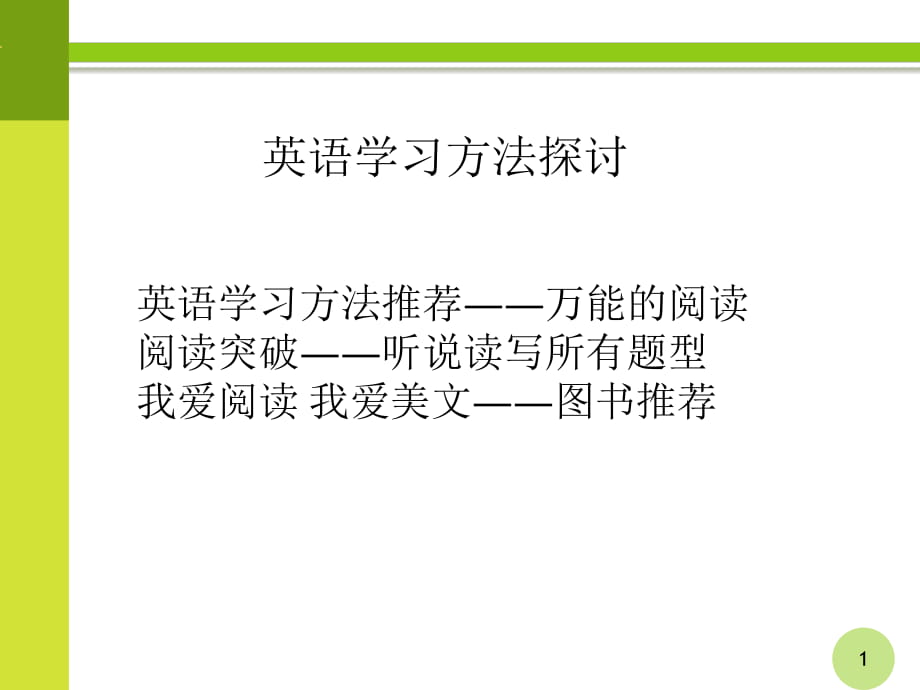《滬教牛津版七年級(jí)U1知識(shí)點(diǎn)總結(jié) 重點(diǎn)句型 詞匯》由會(huì)員分享���,可在線閱讀�����,更多相關(guān)《滬教牛津版七年級(jí)U1知識(shí)點(diǎn)總結(jié) 重點(diǎn)句型 詞匯(26頁(yè)珍藏版)》請(qǐng)?jiān)谘b配圖網(wǎng)上搜索���。
1、1英語(yǔ)學(xué)習(xí)方法推薦萬(wàn)能的閱讀閱讀突破聽(tīng)說(shuō)讀寫所有題型我愛(ài)閱讀 我愛(ài)美文圖書推薦 英語(yǔ)學(xué)習(xí)方法探討 2 3翻譯:我的奶奶是一位身材矮小�、頭發(fā)花白的婦女。My grandma was a short woman with grey hair.My grandma was a short woman who had grey hair.with grey hair 是一個(gè)介詞短語(yǔ)��,修飾限定woman, 作后置定語(yǔ)who had grey hair 同樣是修飾限定作用����,作定語(yǔ),是一個(gè)句子��,稱為定語(yǔ)從句�����。with grey hair 作什么成分 4她是一個(gè)戴著眼鏡而且很高的女孩兒She is a tal
2、l girl with glasses.中國(guó)是一個(gè)歷史悠久的偉大國(guó)家���。China is a great country with a long history.China is a great country. China has a long history. China is a great country that/which has a long history. 5定語(yǔ)的概念:修飾限定一個(gè)名詞或代詞,She is a beautiful girl.He is a handsome boy.定語(yǔ)屬于句子成分���,英語(yǔ)中句子成分有哪些呢����?區(qū)分詞性和句子成分那么英語(yǔ)句子的核心是什么呢? 看下面
3���、兩個(gè)句子My grandma has grey hair. My grandma was a short woman. 6 英語(yǔ)句子必須有動(dòng)詞��,英語(yǔ)的核心語(yǔ)法是“主謂賓結(jié)構(gòu)”和“主系表結(jié)構(gòu)”還有一個(gè)說(shuō)法叫“系表為謂”���,所以英語(yǔ)中所有句子都可以歸納為“主謂(賓)結(jié)構(gòu)”英語(yǔ)中主要句子成分:主、謂�����、賓�����、定、狀�、補(bǔ) 表語(yǔ) 同位語(yǔ)定語(yǔ):修飾限定一個(gè)名詞或代詞狀語(yǔ):修飾動(dòng)詞、副詞或者整個(gè)句子表語(yǔ):系動(dòng)詞后是表語(yǔ)系動(dòng)詞:be動(dòng)詞表示變化的:become, get, turn感官動(dòng)詞:look, sound, smell, taste, feelseem, 7 系動(dòng)詞���,亦稱連系動(dòng)詞(Link Verb)���。作為
4、系動(dòng)詞�,它本身有詞義,但不能單獨(dú)用作謂語(yǔ)�,后邊必須跟表語(yǔ),亦稱補(bǔ)語(yǔ)(形容詞)���,構(gòu)成系表結(jié)構(gòu)說(shuō)明主語(yǔ)的狀況��、性質(zhì)��、特征等情況�。 持續(xù)用來(lái)表示主語(yǔ)繼續(xù)或保持一種狀況或態(tài)度��,主要有keep: He always kept silent at meeting. 他開(kāi)會(huì)時(shí)總保持沉默�。表像用來(lái)表示看起來(lái)像這一概念,主要有seem, look, 例如: He looks so tired. 他看起來(lái)很累��。 He seems (to be) very sad. 他看起來(lái)很傷心。 8 感官感官系動(dòng)詞主要有feel, smell, sound, taste, look 例如: This kind of cloth
5��、 feels very soft. 這種布手感很軟���。 This flower smells very sweet. 這朵花聞起來(lái)很香����。變化這些系動(dòng)詞表示主語(yǔ)變成什么樣�����,變化系動(dòng)詞主要有 become, grow, turn, get, He became mad after that. 自那之后�����,他瘋了�。 She grew rich within a short time. 她沒(méi)多長(zhǎng)時(shí)間就富了�。 問(wèn)題二:What do you think of ? 你認(rèn)為/覺(jué)得怎么樣? 用來(lái)詢問(wèn)對(duì)某人或某事的看法、態(tài)度及其他詢問(wèn)看法的句型�。喬治,你覺(jué)得我的新發(fā)型怎么樣�?_ _ _ _ _ my new hai
6、rstyle, George? 10What is sb/sth like? 詢問(wèn)某人/某事物怎么樣����? 詢問(wèn)的是品質(zhì)���、性格,like 不是動(dòng)詞����,而是介詞。他人怎么樣?����??是問(wèn)某人人品的。What does sb. look like? 用于提問(wèn)人的長(zhǎng)相���、外貌�,意為“他長(zhǎng)得什么樣�����?” 試體會(huì): 11 What does Cathy look like?卡西長(zhǎng)得什么樣? Shes tall, and she has black hair. 她個(gè)子很高��,一頭黑發(fā)。Whats Ruth like? 魯思是個(gè)什么樣的人呢�? Shes quiet and a little shy.她很文靜,有點(diǎn)害羞����。Wha
7、t does he _ ?He is tall and thin.A. like B.be like C. looks like D. look like 答案:D 12問(wèn)題三:翻譯:她是一位有耐心的媽媽�,她花費(fèi)時(shí)間幫助她的孩子。 花費(fèi)時(shí)間的句型: take time to do sth.(耐心地花時(shí)間去做某事)=spend time on sth. /( in) doing sth. Tom takes time to do chores. 耐心花時(shí)間去做家務(wù)���。 He spends 1.5 hours a day watching TV and reading books.翻譯:這個(gè)護(hù)士對(duì)她
8��、的病人很有耐心�。She is a patient mum. She takes time to help her child. The nurse is very patient with her patients. 13 spend 花費(fèi)���,花費(fèi)時(shí)間或金錢。I spend five yuan on/buying the pair of gloves.I paid five yuan for the pair of gloves.The pair of gloves cost me five yuan.spend 主語(yǔ)是人����,句型 spend time/money on sth./in doing
9、 sth.pay 主語(yǔ)是人���,常用句型: payforcost 主語(yǔ)是物�,常用句型:sth. cost sb some moneycost本意是“成本”,所以主要指花錢比如:It cost me five yuan. 14(中考真題) Do you take exercise every day? Yes. I always _ half an hour walking after dinner. A. spend B. take C. cost D. pay 15問(wèn)題四: Why not plan a special Mothers Day for her? 為什么不為她籌劃一個(gè)特別的母親節(jié)呢
10���、?Why not意思為“為何不”,提出自己的建議或征求對(duì)方的意見(jiàn)�,后接動(dòng)詞原型���。句型為: Why not do sth. Why dont you do sth. 句型同義提出建議的句型Shall we ? ; Lets ; What about doing sth. 16Why dont we; What about going hikingIts a nice day, isnt it?Yes, _ go hiking and relax ourselves?A.Why not B. Why dont C. What about D. Why其他選項(xiàng)如何修改:(中考真題)Why not _
11��、 your friends for help when you are in trouble? A. ask B. to ask C. asks D. asking句意:當(dāng)你身處困境時(shí)�,為什么不向你的朋友尋求幫助呢��? 17What about 和 How about 是英語(yǔ)口語(yǔ)中常用的兩個(gè)省略句型�����,它們的意思和用法基本相同�,常常用在以下場(chǎng)合。例如: 向?qū)Ψ教岢鼋ㄗh或請(qǐng)求�。例如: 1 How about going out for a walk? 出去散散步好嗎? 2 What about another cake? 再吃塊蛋糕好嗎�����? 18問(wèn)題五:翻譯:她經(jīng)常給我講笑話使我笑����,但她從不取笑別人��。
12��、She often tells me jokes to make me laugh, but she never makes fun of others.to make me laugh 是動(dòng)詞不定式短語(yǔ)作目的狀語(yǔ)���。make sb. do sth. 意思為“讓某人做某事”make 是使役動(dòng)詞我的粗心讓我的老師變得很生氣。My carelessness makes my teacher get angry.make fun of sb. 意思為“取笑/捉弄某人”不要拿我開(kāi)玩笑���。Dont make fun of me. 19 問(wèn)題六:李老師對(duì)我們的學(xué)習(xí)要求嚴(yán)格�����,但他總是鼓勵(lì)我們���,給予我們支持�����。Mr
13���、 Li is strict about our studies, but he always encourages us and gives us support. be strict about/in sth. 對(duì)某事要求嚴(yán)格be strict with sb. 對(duì)某人要求嚴(yán)格��。我們的英語(yǔ)老師對(duì)我們要求嚴(yán)格��,對(duì)他的工作也很嚴(yán)格���。Our English teacher is strict with us and also in his work. 20重點(diǎn)單詞:remain=still be我希望我們永遠(yuǎn)是朋友�。I hope we will always remain friends.我希望你
14�����、將有一個(gè)光明的前途�。I hope you will have a bright future.encourage=give a lot of hope He always encourages us 21在周末,她的父母經(jīng)常鼓勵(lì)她閱讀或者去參加一些戶外活動(dòng)����。On weekends her parents often encourage her to read or take part in some outdoor activities.With the encouragement of one of her teachers, she began to write.(中考真題)Jessica
15、s parents always encourage her _ out her opinions. A. speak B. speaking C. to speak D. will speak 在她的一位老師的鼓勵(lì)下��,她開(kāi)始寫作��。 22永不放棄����,你就會(huì)成功。Never give up and youll be successful.如果賓語(yǔ)是代詞�,必須放在give up 之間 盡管數(shù)學(xué)很難����,但別放棄它����。Although Maths is very difficult, dont give it up.放棄做某事,用give up doing sth.你必須戒煙�����。 You must give
16��、up smoking. 23 (中考真題)Many successful people have the same qualitythey never _ no matter what difficulties theyve had. A. give up B. stay up C. cheer up successful形容詞���,意思為“成功的”He is successful in doing everything.他做一切事情都很成功�����。stay up 表面理解�����,一直向上待著,表示“熬夜”cheer up 使“振奮”許多成功人士都有相同的品質(zhì)不管他們遇到了什么困難�����,他們從不放棄。 24 su
17�����、cceed 動(dòng)詞����,success 名詞Work hard and you will succeed.He is a great success as a teacher.作為一名教師,他非常成功���。At last he successfully worked out the problem.最后他成功地做出了這道題�����。success 抽象名詞 成功 成就 勝利I dont have much success with cooking. 我飯做得不好�。success 表示成功的事或成功的人可數(shù)名詞�����。 I just want to be a success. 我只想成為一個(gè)成功者���。His book was a big success. 他的書取得了巨大成功�����。 25What do you think of Amy, Mr Li?Shes strict about her studies, so shes always successful in her exams. She never gives up when there are difficulties.她對(duì)她的學(xué)習(xí)要求嚴(yán)格�����,所以在考試中她總是成功�����。當(dāng)遇到困難的時(shí)候���,她從不放棄��。 26
 滬教牛津版七年級(jí)U1知識(shí)點(diǎn)總結(jié) 重點(diǎn)句型 詞匯
滬教牛津版七年級(jí)U1知識(shí)點(diǎn)總結(jié) 重點(diǎn)句型 詞匯

